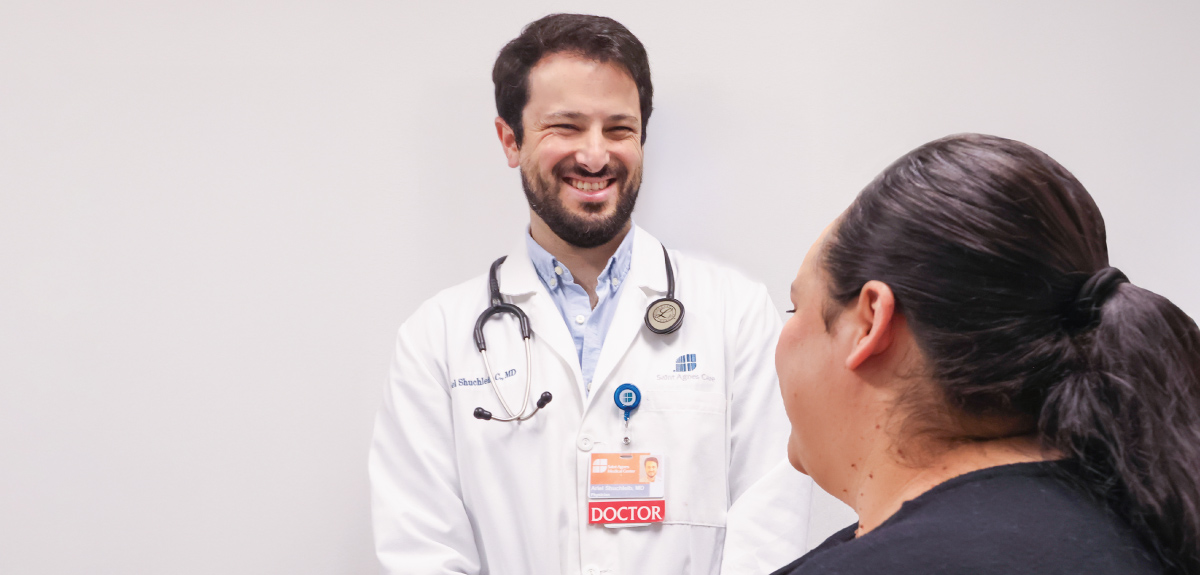Debunking 8 weight loss myths
April 23, 2025
With self-proclaimed health experts sharing their quick weight loss methods on social media and “miracle drugs” making headlines, it can be challenging to figure out what information is true. More importantly, which of these “fixes” is right for you?
Our Saint Agnes Bariatric Surgeons are breaking down the top myths about weight loss medications and surgery to help you learn the truth.
Myth: People living with obesity are unmotivated
Obesity is caused by an imbalance of hormones that send signals to the brain telling it that the body is at a normal weight, so when the person tries to lose weight, the brain thinks the body is starving.
“Even the most motivated people will regain weight they lose from a diet or exercise unless that set point in their brain gets reset,” says Daniel Swartz, MD, Saint Agnes Bariatric Surgeon. “Weight loss surgery helps to reset those hormones, so the brain realizes that the body needs to lose fat instead of storing it.”
Myth: Weight loss medications are miracle workers
While medications that tout weight loss benefits can have impressive initial results, for most patients, this regimen is difficult to maintain long term either due to intense side effects or costs.
“At this point in time, we just don’t have the data to know how these medications will affect patients long term,” says Ariel Shuchleib, MD, Saint Agnes Bariatric Surgeon. “A lot of patients simply can’t tolerate the medications due to uncomfortable side effects, including gastrointestinal issues, that occur when the medication is taken at high doses.”
Myth: Weight loss medications work better than surgery
Typically, weight loss medications only target one or two of the hormones that cause obesity. This means that many people experiencing obesity may lose weight on these medications, but their other health conditions like diabetes, high cholesterol and high blood pressure may be left unresolved.
“Medications are not a substitute for surgery,” says Dr. Swartz. “They can help with a comprehensive weight loss plan that includes a good diet and exercise, but they can’t do what surgery does. Patients who get surgery will often see a full resolution of their health conditions caused by obesity.”
Myth: Bariatric surgery is the easy way out
“It’s common to think that obesity is a choice, so the solution must be that a person just needs to choose to eat and exercise well, and they will lose weight,” says Dr. Shuchleib. “But like any other disease, it’s a physiologic problem. The brain is actively working against these patients to inhibit weight loss.”
Patients go through a rigorous weight loss program in the months leading up to surgery – including diet, exercise and sometimes medications – to ensure they build the healthy habits they need before their procedure for a successful result after surgery and in the years that follow.
Myth: Weight loss surgery is dangerous and has a lot of risks
Like any surgical procedure, there are risks for complications, including blood clots, leaks, infection, illness and urinary tract infections. However, only about one percent of patients will have surgical complications, and the risk of death from surgery is one tenth of a percent.
“With surgery, you have to weigh the risks and benefits to make your decision, but even more dangerous than surgery is living with obesity and the other health conditions that impact daily life,” says Dr. Swartz.
Myth: Surgery is painful
All people experience pain in different ways, but in general, weight loss surgery is performed with just a few small incisions, which helps to reduce trauma on the body and leads to a faster, less-painful recovery.
“Most of our patients will be discharged with a prescription for Tylenol without the need for stronger pain medication,” says Dr. Shuchleib.
Myth: Most people will regain the weight after surgery
Based on current studies, about 20 percent of patients will regain a significant amount of weight a few years after surgery.
“We see that the patients who regain weight are those who go back to old habits. They reform emotional attachments to eating, they snack, they don’t weigh themselves regularly, stop exercising and stop coming to their check-in appoints,” says Dr. Swartz. “Our patients who are successful are the ones who are ready to make a change and are willing to put in the hard work for the rest of their lives to maintain a healthy weight.”
Myth: Getting surgery will permanently prevent cravings and overeating
After surgery, a majority of patients will experience a significant reduction to their hunger response for a year or more. The snacks and treats that made their mouth water before surgery may become their least favorite foods.
“Sometimes our patients crave salad, which is something they never experienced before surgery,” says Dr. Shuchleib. “Some habits like eating cake every night after dinner can be harder to break because this is a learned response rather than a physiological one determined by the brain. So, while cravings can shift, it’s still up to the patient to make smart choices with their food to maintain weight loss long term.”

Ready to lose the weight for good?
Let our team get you back to living life to its fullest. Discover how our surgical weight loss program can help you.
Learn more